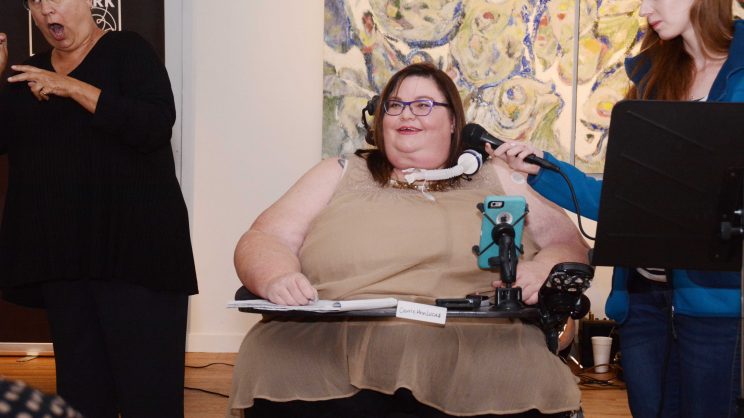As we vow to do our best to kick as many asses as thoroughly as Carrie did.
The world has lost a fierce advocate, brilliant lawyer, and talented photographer. Carrie Ann Lucas, a disability rights attorney who pioneered representation for parents with disabilities, died from complications from septic shock. She was 47 years old.
Disability Law United recognized Carrie in 2016 for her work in intersectional civil rights, celebrating her outstanding leadership in disability rights, parents’ rights, LGBTQI rights, human dignity, and faith.
Disability Law United’s Co-Executive Directors first worked with Carrie not long after they started their small civil rights law firm in 1996, when she asked us to challenge her graduate program at the Iliff School of Theology for their failure to provide access and effective communication. While she was working on her Masters of Divinity there, she worked with others to protest institutional racism on the faculty and in the library. This was not her first protest: early on, she protested her high school’s refusal to permit a disabled student to march with the band.
After getting her M. Div., she worked at the Colorado Cross-Disability Coalition, got her law degree at the University of Denver (on the full-ride Chancellor’s Scholarship), got a prestigious Equal Justice Works fellowship, and founded Disabled Parent Rights, a non-profit devoted to ensuring that people with disabilities have equal rights in parenting. She also became a national expert and trainer on the rights of parents with disabilities and, through her legal advocacy, secured decisions upholding and promoting those rights here in Colorado. Most recently she was recruited by the Colorado Office of Respondent Parents Counsel to help set up a program to train other lawyers around the state to replicate the sort of impact she was making.
During all of this time, she also acted as the plaintiff in a number of ground-breaking disability rights lawsuits, including one of the largest public accommodations class actions and others bringing equal access to a variety of different facilities.
Throughout her life, Carrie taught, protested, litigated, wrote, and advocated for a broad understanding of civil rights and human dignity, and consistently brought an intersectional approach to her work: bringing the parental perspective to disability rights, and vice versa; insisting on disability rights in civil rights spaces; and the importance of voices of color and LGBTQI people in disability rights spaces. Carrie may have been the only wheelchair-using Latina with a bumper sticker reading “just another disabled lesbian for Christ,” dressed in camo, driving her trak-chair into the wilderness in search of the perfect photo.
While the immediate cause of death was septic shock, Carrie was in fact the victim of our healthcare system and the brutal cost containment procedures of her insurance company, UnitedHealthcare. Carrie had a severe neuromuscular disease, a rare form of muscular dystrophy. She relied on a power wheelchair, and had used a ventilator for years. In January of 2018, she got a cold which turned into a lung infection. UnitedHealthcare refused to pay for the specific inhaled antibiotic that she needed, instead forcing her to take a less effective drug, to which she experienced a severe reaction. This created a cascade of problems and loss of function (including her speech). United Healthcare’s attempt to save $2,000 ultimately cost over $1 million in health care costs over the past year.
We are very grateful for all Carrie has taught us about disability rights and intersectionality, and for being a brilliant and hilarious colleague and friend. We will miss her very much.
[CCDC has posted a more detailed obituary, from which I have plagiarized liberally.]


In Carrie’s death, the world has lost one of its outstanding activists. I will forever remember her warm smile and the gutsy way that she grabbed life by the horns. Carrie Lucas was truly an Amazing Grace.
She was an incredible light.
Carrie. We didn’t know you but you are our sister in the continued fight against the goliath to our David. May you be in the place that gives you some peace and watch over us as we all continue to fight the good fight. You made a difference and will be in our thoughts and prayers along with those lives you changed. Again the Delta family and their organization informs and confirms that we are not alone. Advocacy and love us all we can do in your memory.
Let us all remember that it’s what we do with our precious time between birth and death and not what they tell us we can’t do due to sexual orientation, physical and mental disability and financial limitations. We come here in many forms to make the world better. Carrie rest in peace.
Many thanks.
Thanks for your powerful tribute to a marvelous, inspiring woman. She will be missed by many for her groundbreaking work . May her legacy continue through you.
Thank you Carrie! I will protect a flame from the fire you started and pray that it roars like you someday!
I was an adjuster at UHC in 2001 when the Patients’ Bill of Rights was before congress. The Senate version provided rights within the Employee Retirement Income Security Act [ERISA] that allowed patients to sue managed health care organizations in state and federal court for denial of care .
William McGuire, former UHC Chairman, Director, and CEO sent out a mass email that requested employees to lobby their representatives to vote against the Senate version of the bill as immediately brought to mind, “Why is he so worried ?” That year, congressional negotiations on the provision eventually failed.
A few years later [2006] McGuire was charged and later convicted by the SEC following a lengthy investigation triggered by a Wall Street Journal article about UHC management’s rampant back-dating of hundreds of thousands of dollars in stock options enabling them to buy at earlier bargain prices and enhance their selling profits. At least as far back as 1999, UHC Vice-President of Underwriting, Michael Mooney, was charged and convicted by the SEC of insider trading after he profited from stock options timed around UHC’s acquisition of MetroHealth.
The SEC fined McGuire $468 million that alongside his earnings, his stock piracy, and his $1.1 billion exit bonus, is typical executive level criminal justice illusion . His was the largest golden parachute pay-out in corporate history at the time which speaks volumes about how much he added to UHC’s bottom-line during his tenure .
UHC’s historical record with their outwardly identified HMO product lines trailed miserably across the United States with a string of lawsuits from their Hartford, Conn. beginnings to the west coast. Our team of new hires was trained or “specialized” for provider-end handling of claim issues with UHC’s HMO contracted physicians. Early-on we learned how dismal UHC’s performance capabilities were in the HMO arena that, without little-known “backdoor” system work-arounds, often acted prohibitive to proper claim processing.
It didn’t take a rocket scientist to note UHC’s close-out of their HMO business as it leap-frogged from one claims center to the next heading westward. UHC eventually tossed me out in their wash when they sold their HMO business to Blue Shield. Now that’s not to say UHC bailed entirely out of the HMO racket. Their other product lines smack every bit as much like HMOs under EPO, PPO, and other classic acronyms used for essentially the same form of managed care coverage. Back in the day during my employ in the late ‘90s/early 2000, HMO’s were outlawed in Oregon and we were instructed to never use “HMO” in reference to these other thinly-veiled product lines when, periodically, an excess volume of Oregon calls kicked over to our California center. This, to me, illustrates that UHC incorporates lying as a regular part of how they do business.
In my final days there as the “last [HMO specialized] Mohican” the quagmire of HMO claims either already litigated or headed there were routed to me to process for payment. When I went rogue and gained the assistance of the legislative analyst to force UHC’s rightful payment of a couple of 6-digit hospital claims closed out after the employer-client dropped UHC coverage in favor of a competitor, I pretty much walked myself into the noose and likely hastened my unemployed destiny. The reason stated for my uneventful firing was some insubordinate comment overheard six months prior without mention. It actually worked to my welcomed relief from an industry of employees virtually chained to a desk necessarily stocked with a “7-11 drawer” of junk food that, along with the ever-flowing supply of coffee provided, seemed in itself an ironic recipe for heart attack .
Someone of Carrie Ann’s obvious self-empowerment and kick-ass acumen that championed matters of illegal discrimination and oppression of persons with disabilities surely took UHC to the courtroom mat , did she not? I’m not able to find evidence of this and if it didn’t happen, I hope someone takes up this champion’s torch to see that it does in her legacy, in the best interests of her children, and for the well-being of others that UHC undoubtedly treats with the same unjustly self-enriching negligence. After all, human beings are generally only temporarily “able-bodied”. And McGuire’s clearly paranoid angst over legislation providing an insured’s right to sue was not without reason. Likely the root of his reaction was his own intent to act in negligence with total disregard of the predictable bad outcome, an ingrained business culture as seems very much reflected here.